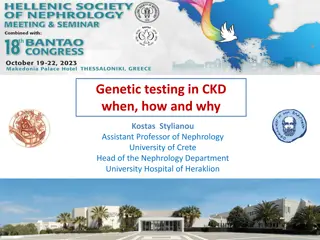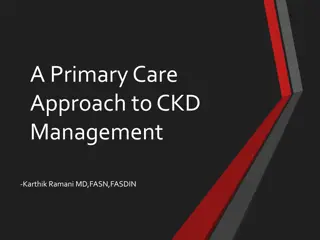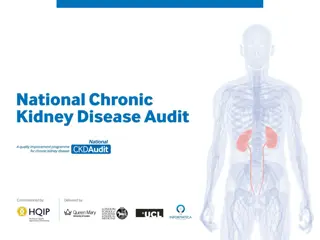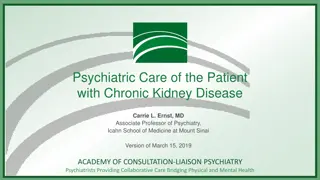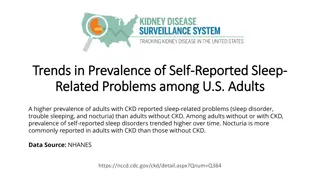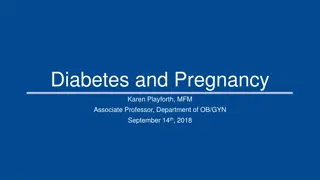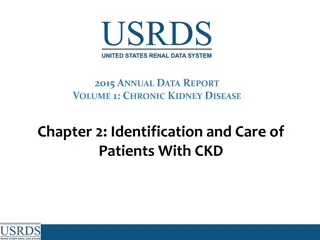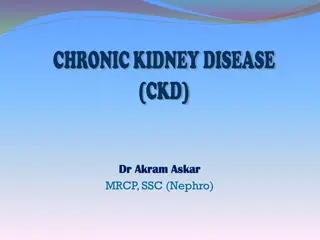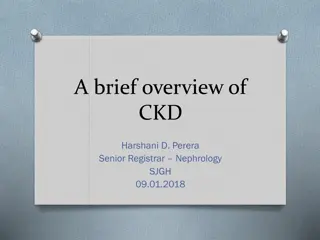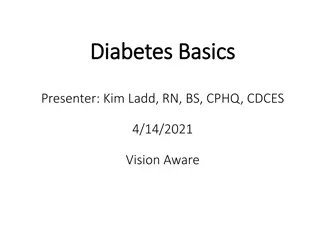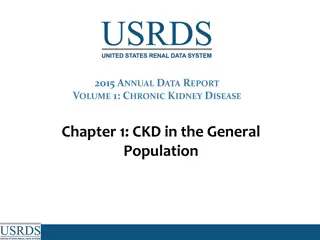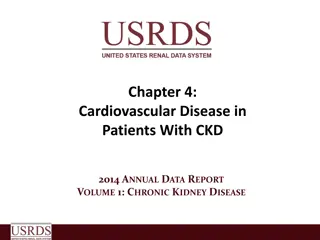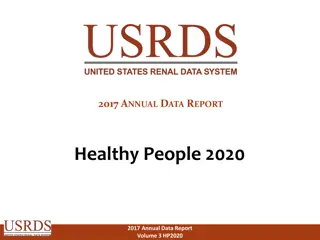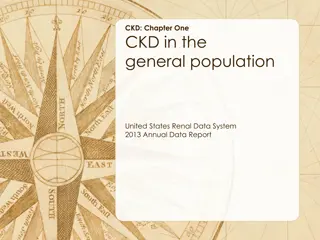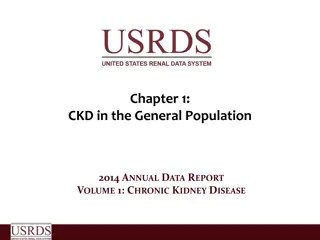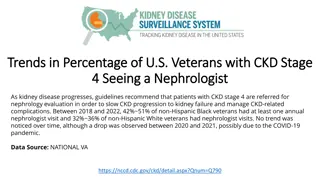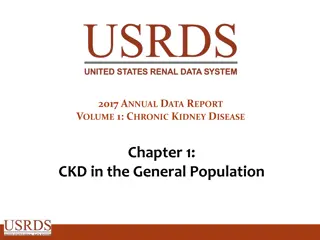Managing Patients with Diabetes and CKD
Diabetes mellitus poses a significant health concern due to its association with chronic kidney disease (CKD). This clinical practice guideline addresses the management of patients with diabetes and CKD stage 3b or higher. Explore the interplay between diabetes and CKD, including potential causes and challenges in patient management. Discover insights on renal replacement modality selection for patients with diabetes and end-stage renal disease. Gain valuable knowledge on the relationship between diabetes, CKD, and the selection of dialysis modalities to optimize patient care.
Download Presentation

Please find below an Image/Link to download the presentation.
The content on the website is provided AS IS for your information and personal use only. It may not be sold, licensed, or shared on other websites without obtaining consent from the author.If you encounter any issues during the download, it is possible that the publisher has removed the file from their server.
You are allowed to download the files provided on this website for personal or commercial use, subject to the condition that they are used lawfully. All files are the property of their respective owners.
The content on the website is provided AS IS for your information and personal use only. It may not be sold, licensed, or shared on other websites without obtaining consent from the author.
E N D
Presentation Transcript
Company LOGO Presentation TITLE www.company.com
Clinical Practice Guideline on management of patients with diabetes and chronic kidney disease stage 3b or higher (eGFR <45 mL/min) www.company.com
Diabetes mellitus is becoming increasingly prevalent and is considered a rapidly growing concern for healthcare systems. Besides the cardiovascular complications, diabetes mellitus is associated with chronic kidney disease (CKD). www.company.com
CKD in patients with diabetes can be caused by true diabetic nephropathy, but can also be caused indirectly by diabetes, e.g. due to: 1. polyneuropathic bladder dysfunction 2. increased incidence of relapsing urinary tract infections 3. macrovascular angiopathy. www.company.com
However many patients who develop CKD due to a cause other than diabetes will develop or may already have diabetes mellitus. Finally, many drugs that are used for management of CKDs, e.g. corticosteroids or calcineurin inhibitors, can caus diabetes. Despite the strong interplay between diabetes and CKD, the management of patients with diabetes and CKD stage 3b or higher (eGFR <45 mL/min) remains problematic. www.company.com
There is a paucity of well-designed, prospective studies in this population, as many studies exclude either patients with diabetes, or with CKD stage 3b or higher (eGFR<45mL/min), or both. We hope you will enjoy reading this guideline and that you will find it useful in your everyday management of patients with diabetes and CKD stage 3b or higher. www.company.com
CHAPTER 1: ISSUES RELATED TO RENAL REPLACEMENT MODALITY SELECTION IN PATIENTS WITH DIABETES AND END-STAGE RENAL DISEASE www.company.com
Should patients with diabetes and CKD stage 5 start with peritoneal dialysis or hemodialysis as a first modality? www.company.com
We recommend: We recommend giving priority to the patient s general status and preference in selecting renal replacement therapy as there is an absence of evidence of superiority of one modality over another in patients with diabetes and CKD stage 5 (1C). We recommend providing patients with unbiased information about the different available treatment options (1A). www.company.com
Should patients with diabetes and CKD stage 5 start dialysis earlier, i.e. before becoming symptomatic, than patients without diabetes? www.company.com
We recommend: We recommend initiating dialysis in patients with diabetes on the same criteria as in patients without diabetes (1A). www.company.com
In patients with DM and CKD stage 5 should a native fistula, graft or tunnelled catheter be preferred as initial access? www.company.com
We recommend: We recommend that reasonable effort be made to avoid tunnelled catheters as primary access in patients with diabetes starting HD as renal replacement therapy (1C). We recommend that the advantages, disadvantages and risks of each type of access be discussed with the patient. www.company.com
Is there a benefit to undergoing renal transplantation for patients diabetes and CKD stage 5? www.company.com
We recommend: We recommend providing education on the different options of transplantation and their expected outcomes for patients with diabetes and CKD stage 4 or 5 who are deemed suitable for transplantation (1D). www.company.com
Statements only for patients with type 1 diabetes and CKD stage 5 We suggest: living donation kidney transplantation or simultaneous pancreas kidney transplantation to improve survival of suitable patients (2C). We suggest against: islet transplantation after kidney transplantation with the aim to improve survival (2C). We suggest: pancreas grafting to improve survival after kidney transplantation (2C). www.company.com
Statements only for patients with type 2 diabetes and CKD stage 5 We recommend against : pancreas or simultaneous kidney pancreas transplantation (1D). We recommend: Diabetes in itself should not be considered a contraindication to kidney transplantation in patients who otherwise comply with inclusion and exclusion criteria for transplantation(1C). www.company.com
CHAPTER 2 ISSUES RELATED TO GLYCAEMIC CONTROL IN PATIENTS WITH DIABETES AND CKD STAGE 3B OR HIGHER (eGFR <45 mL/min) www.company.com
A. Should we aim to lower HbA1C by tighter glycemic control in patients with diabetes and CKD stage 3b or higher (eGFR <45 mL/min? B. Is an aggressive treatment strategy (in number of injections and controls and follow- up) superior to a more relaxed treatment strategy in patients with diabetes and CKD stage 3b or higher (eGFR <45 mL/min) and using insulin? www.company.com
We recommend: We recommend against: tighter glycaemic control if this results in severe hypoglycaemic episodes (1B). We recommend: vigilant attempts to tighte glycaemic control with the intention to lower HbA1C, when values are >8.5% (69mmol/mol)(1C). www.company.com
Severity of hypoglycaemic episodes are defined as mild when it can be treated by the patient himself and as severe when assistance is required. The most important concern is to avoid episodes of hypoglycaemia. Empower patients at moderate and high risk for hypoglycaemia to perform regular follow-up of blood glucose level by using validated point of care devices. www.company.com
It is unclear whether in this specific patient cohort, aiming at a lower HbA1C value by tightening glycaemic control results in improved outcomes, in terms of mortality and morbidity. There is some concern that excess mortality and morbidity can be induced by increasing the risk for (severe) hypoglycaemia. www.company.com
What did we find? We found one recent systematic review in dialysis patients on the association between HbA1C and outcome that included 10 studies (83 684 participants) (9 observational studies and 1 secondary analysis of a randomized trial). Likewise, patients with a mean HbA1c value>8.5% had a higher adjusted risk of mortality (HR 1.29; 95% CI 1.23 1.35). In incident patients, mean HbA1c vels <36 mmol/mol (5.4%) were also associated with increased mortality risk (HR 1.29; 95% CI 1.23 1.35). www.company.com
In the general population, tight glycaemic control does not result in improvement of all-cause and cardiovascular mortality,but results in an increased risk for hypoglycaemia. As in CKD stage 3b or higher (eGFR <45 mL/min), the risk of hypoglycaemia is enhanced and the survival benefit is probably lower due to the general lower life expectancy, tight HbA1C control is probably even less relevant in this patient cohort. www.company.com
On the other hand, observational data show that lower HbA1C is associated with better outcome, so at least one should (cautiously) try to lower HbA1C, if this can be obtained without increasing the risk for hypoglycaemia. www.company.com
We suggest: We suggest vigilant attempts to tighten glycaemic control with the intention to lower HbA1C according to the flow chart in Figure 4 in all other conditions (2D). www.company.com
We recommend: We recommend intense self-monitoring only to avoid hypoglycaemia in patients at high risk for hypoglycaemia (2D). www.company.com
self-monitoring can not be recommended if the only aim is to reduce HbA1C. However, in patients at risk for hypoglycaemia i.e. mostly those taking active medication with a high risk of hypoglycaemia, e.g. insulin, regular monitoring should be performed to avoid overshooting and hypoglycaemia. The risk for hypoglycaemia outweighs the potential benefits of reduced microvascular complications in patients with advanced stages ofCKD. www.company.com
Are there better alternatives than HbA1c to estimate glycaemic control in patients with diabetes and CKD stage 3b or higher (eGFR <45 mL/min/ 1.73 m2)? www.company.com
We recommend: We recommend the use of HbA1C as a routine reference to assess longer term glycaemic control in patients with CKD stage 3b or higher (eGFR <45 mL/min/1.73 m2) (1C). www.company.com
The following factors are potentially associated with a lower than expected HbA1C: 1. decreased red blood cell survival 2. increased red blood cell formation (use of iron, RhuEpo). The following factors are potentially associated with a higher than expected HbA1C: accumulation of uraemic toxins. www.company.com
Due to the availability of relatively inexpensive and routinely measured HbA1c assays and the inconsistent or limited data to prove the superiority of other glycaemic markers (glycated albumin, fructosamine, 1,5-AG and continuous glucose monitoring) at this time, the guideline development group judges that: HbA1c should remain the reference standard for glycaemic monitoring in patients with diabetes and CKD stage 3b or higher (eGFR <45 mL/min). www.company.com
In the future, continuous subcutaneous glucose monitoring seems to be a promising method to correctly evaluate glycaemic control in patients with diabetes undergoing HD and in whom more intense glycaemic control is judged to be of relevance. www.company.com
A. Is any oral drug superior to another in terms of mortality/complications/glycemic control in patients with DM and CKD stage 3b or higher? B. In patients with diabetes type 2 and CKD stage 3b or higher (eGFR <45 mL/min/1.73 m2), is maximal oral therapy better than starting/adding insulin at an earlier stage? www.company.com
We recommend: We recommend metformin in a dose adapted to renal function as a first line agent when life style measures alone are insufficient to get HbA1C in the desired range (1B). We recommend adding on a drug with a low risk for hypoglycaemia as additional agent when improvement of glycaemic control is deemed appropriate (1B). www.company.com
We recommend: We recommend instructing patients to temporarily withdraw metformin in conditions of pending Dehydration when undergoing contrast media investigations or in situations with an increased risk for AKI www.company.com
Consider instructing patients by using credit-card type flyers on when to temporarily withdraw metformin. www.company.com
In patients with diabetes type 2 and CKD stage 3b or higher (eGFR <45 mL/min/1.73 m2) who are on metformin, the decision to withhold the drug 48 h before and after administration of contrast media should be taken by the treating physician, balancing the probability of emergence of contrast-induced nephropathy (type and amount of contrast,intravenous versus intra-arterial), and presence of other coexisting factors that might cause sudden deterioration of kidney function (dehydration, use of NSAID, use of inhibitors of the RAAS system) against the potential harms by stopping the drug . www.company.com
As renal clearances of different glycaemia-lowering agents might differ, combining different glycaemia- lowering drugs in a one pill formulation can lead to overdosing of one of the constituents in patients with CKD stage 3b or higher. www.company.com
Metformin was the only drug that has a proven beneficial impact on all-cause and cardiovascular mortality. Risk of hypoglycaemia was reported to be low with metformin, glipizide, acarbose, DPP-IV inhibitors and the SGLT2 inhibitors. www.company.com



